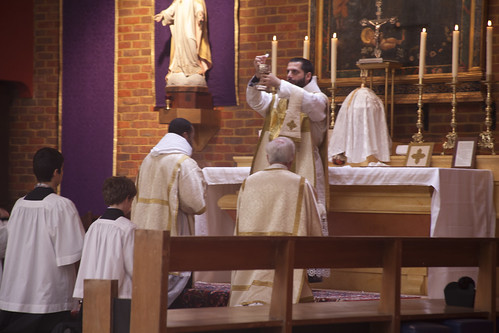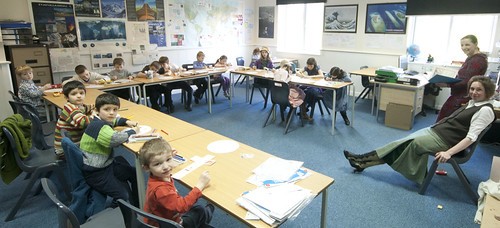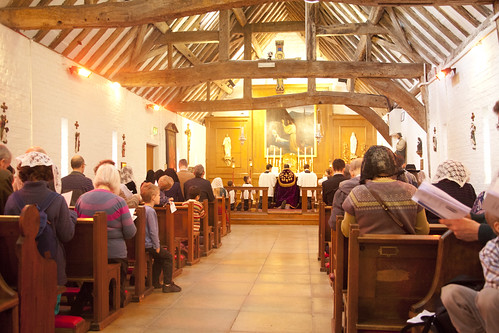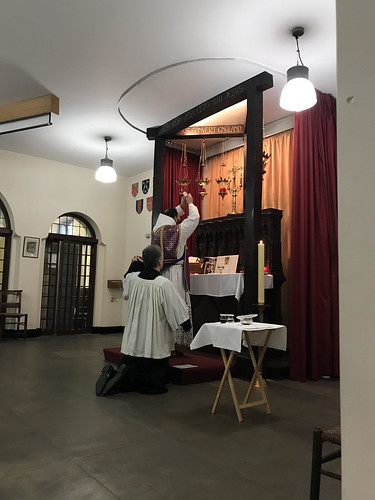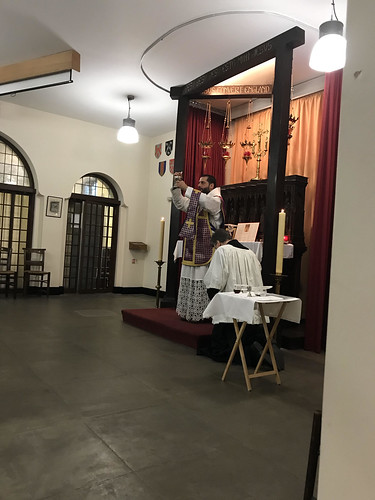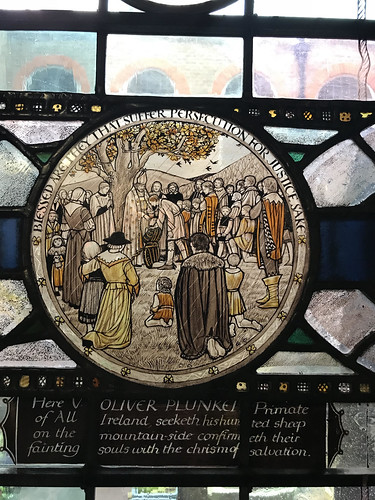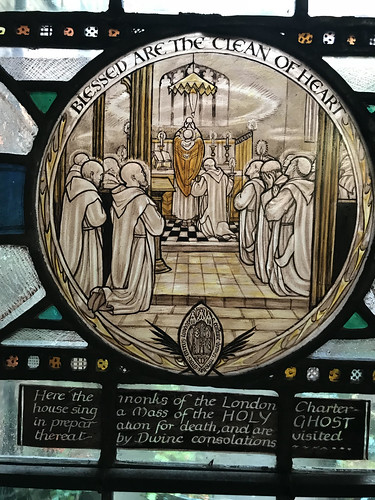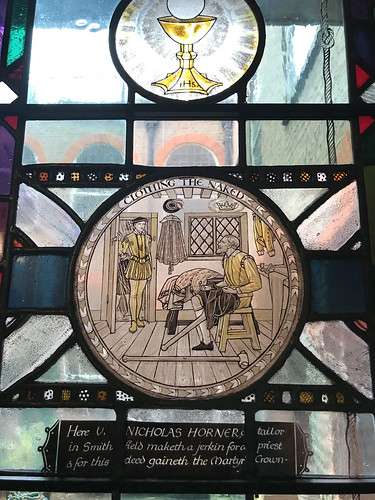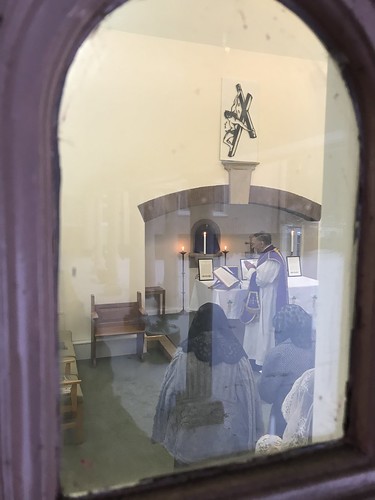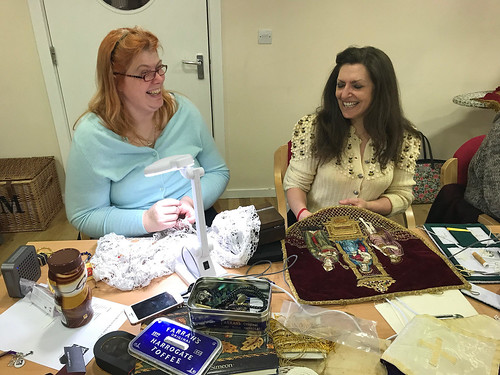Chairman's Blog
Join the pro-lifers at London's St Patrick's Day parade
From 'Right to Life'

Dear Supporter,
Last weekend saw the All Ireland Rally for Life in Dublin, at which up to 100,000 people marched for life, for mothers and babies and to save the Eighth Amendment to the Irish Constitution!
Especially if you’re Irish or have Irish ancestry (but even if you’re not or don’t!), to signify your solidarity with this campaign, please join London Irish United For Life as they attend the St. Patrick's Day Parade.
The plan for this is:
–> Meet at the Church of the Immaculate Conception in Farm Street (W1K 3AH) at 10:30 for tea/coffee.
–> Walk to the March starting area between Hyde Park Corner and Half Moon Street in Piccadilly (nearest tubes Hyde Park Corner and Green Park).
–> Those coming late, or who miss the 10:30 meeting can come to the London Irish United for Life starting area, which will be in Section E, Number 57, which is predicted to be between Down Street and Old Park Lane. Stewards in pink high-vis jackets will be there to direct people to sections. People should look out for signs saying ‘Section E’. Everyone needs to be in place by 11:15.
–> Posters will be provided. Remember to wear green!
Last year, the abortion lobby received a boost by the London Irish Abortion Rights Campaign forming a section in the St. Patrick’s Day Parade 2017. This will be an important way to give balance, show support for the fight for the right to life of unborn children, and to bolster the Save The Eighth campaign in Ireland.
Please do share, invite others, and come along!
Thanks in advance for all your help, and thanks again for all that you do to help safeguard human dignity and the right to life.
With our kindest regards,
The Team at Right To Life
Support the work of the LMS by becoming an 'Anniversary Supporter'.
LMS Priest Training Conference: book now! April 9-12th
 The Latin Mass Society will be holding a residential training conference for priests, deacons, seminarians and laymen wishing to learn to celebrate or serve Mass in the Extraordinary Form. It will be held at Prior Park College near Bath from Monday 9th April to Thursday 12th April 2018.
The Latin Mass Society will be holding a residential training conference for priests, deacons, seminarians and laymen wishing to learn to celebrate or serve Mass in the Extraordinary Form. It will be held at Prior Park College near Bath from Monday 9th April to Thursday 12th April 2018.Tuition will be in small groups. For clergy and seminarians, this will be provided by priests experienced in the Extraordinary Form, for servers this will be provided by laymen with years of experience in the Extraordinary Form.
 The conference will start after lunch on the Monday and conclude before lunch on the Thursday.
The conference will start after lunch on the Monday and conclude before lunch on the Thursday.Full-time students: £60
Seminarians: FREE OF CHARGE
Support the work of the LMS by becoming an 'Anniversary Supporter'.
SCT Family Retreat: booking reminder
Don't forget to book for the St Catherine's Trust Family Retreat, taken this year by Canons Montjean and Tanner of the Institute of Christ the King Sovereign Priest.
It is taking place at the Oratory School near Reading over Low Sunday Weekend: 6-8th April.
Book online here.
The Retreat is, as its name implies, designed to allow families to attend together. We provide activities for the younger children during the spiritual conferences offered by the retreat-givers. Everyone, however, is welcome to attend.
Prices are lower than last year, and bursaries are available from the Latin Mass Society for those who are in financial difficulties.
Photos of last year's retreat, which took place over Passion Sunday weekend because of the late Easter.
Support the work of the LMS by becoming an 'Anniversary Supporter'.
Mass in Tyburn last Saturday
Last Saturday a Traditional Sung Mass was celebrated in the Relic Chapel of Tyburn Convent in London, by Fr Serafino Lanzetta. It was celebrated with Low Mass ceremonies, and just one server, accompanied by two singers. This Mass was sponsored by the Latin Mass Society.
The occasion was a youth conference organised by the Catholic Medical Association (and on Facebook), on the subject of conscience. I gave a talk, as did John Smeaton of SPUC and s sister of the convent. Fr Lanzetta gave a sermon on the same subject.
It was a great privilege to hear Mass in this place, where so many relics of the martyrs can be seen. There are also some lovely stained glass windows showing episodes from their lives, illustrating for example the Corporal Works of Mercy. I love the rain in the above panel, showing St Oliver Plunket giving the sacrament of Confirmation on a hillside.
Above the Carthusians celebrate Mass before finally defying Henry VIII by refusing the swear the Oath of Supremacy, which denied the authority of the Pope.
The chap above, Bl. Nicholas Horner, was a tailor. The crime for which he died was making a doublet for a priest, contravening the law against giving comfort and assistance to priests. He had already lost a leg because of the chains he endured during a previous period of imprisonment.
Support the work of the LMS by becoming an 'Anniversary Supporter'.
The Traditional Mass returns to Holy Trinity, Hethe
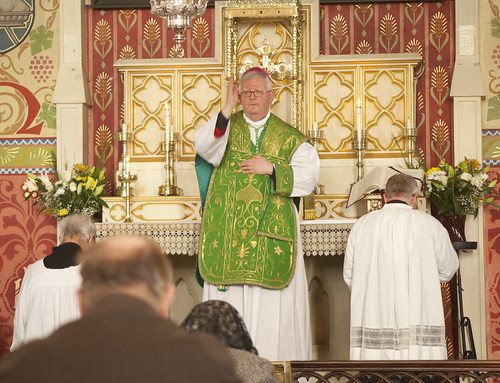 |
| Archbishop Bernard Longley celebrated Pontifical Low Mass in Holy Trinity in January 2017 |
I am pleased to be able to announce that thanks to the good will and hospitality of the Archdiocese and of the Parish Priest, Canon John Batthula, the Traditional Mass will once again be celebrated on Sundays at Holy Trinity, Hethe.
Holy Trinity Church is outside Bicecester: Hardwick Road, Hethe OX27 8AW. (Map)
Support the work of the LMS by becoming an 'Anniversary Supporter'.
Do we want to solve the problem of sacrilegious Communions?
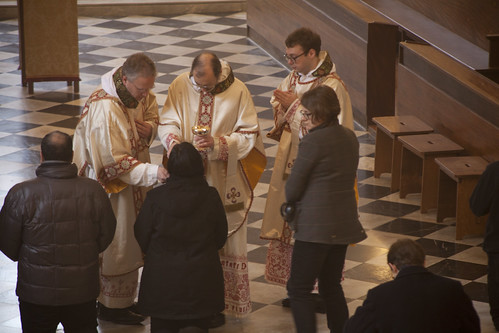 |
| Holy Communion at a High Mass in the Domincan Rite at Oxford's Blackfriars |
Sometimes people like to complain about problems but do not, really, want to solve them. If you offer a solution, they are uninterested, or even angry. The problem is important to them. It may even be a way for them to get something they want: perhaps to extract a concession from someone. So I ask: does anyone (anyone in authority) actually want to solve the problem of sacrilegious communions?
Pope John Paul II pointed out the problem way back in 1980 (Dominicae Cenae):
The situation is now vastly worse than in 1980. Many go without real reflection. Others, who might be thinking about how they ought to go to Confession first, find it embarrassing or even physically awkward to avoid going up too. It has become a common attitude that if you don't go to Communion, you've not been to Mass properly: you've not fulfilled your obligation. And all this is to say nothing of the problem of those who feel excluded, or the priests who feel they need to exclude them, because of notorious public sin, a problem which is the root of the greatest crisis in the Church, according to some, since Arianism, and which is threatening to cause a schism.
As a matter of fact there is a perfectly straightforward solution, which doesn't require any change to the Church's teaching about Marriage, or sacramental discipline about public sinners. Nor does it require priests to enforce brutal and (to many church-going Catholics) incomprehensible restrictions on the reception of Communion. It requires a liturgical practice which is not so problematic that it has not in the past been permitted over many years and over widely varying social conditions.
Here how it works. The problem of sacrilegious communion, and the related problem arising from the theoretical obligation to prevent at least one category of these at the Altar rail, arises largely because of the very public nature of the reception of Communion in our churches today. Although people generally no longer dress up for it, it is a parade. If we take that element away, we have greatly ameliorated the problem.
What I am referring to is the practices surrounding Holy Communion which were universal in the Church for a number of centuries up to the 20th century. Since they died out at the outer limit of today's living memory, between the two World Wars, people may be surprised to hear what they were.
1. Communion is not commonly distributed during Mass. It is distributed before, after, or between Masses, or on application to the parish priest.
2. Liturgical participation in Mass is focused not on the reception of Holy Communion but on witnessing the newly-consecrated Host and the Chalice, which are surrounded with as much solemnity as possible, enriched with indulgences, and so on.
If Holy Communion is not distributed at Mass after the priest's Communion then reception ceases to be a public act. The whole question of what people will think if you do or do not join the queue with everyone else disappears. People may still receive Holy Communion in groups at the Altar Rails, of course, but they do not do so in front of the entire congregation.
The older practice is not the most ancient practice. It was discouraged under the influence of the Liturgical Movement which sought to re-integrate Holy Communion into Mass where, it was felt, it belonged, from a ritual point of view, and also to make the Sacrament of Communion a more appropriately communal act. I don't have any particular disagreement with the arguments in favour of having the Communion of the Faithful in Mass, but they are clearly not arguments of infinite weight. Other things being equal it makes more sense, perhaps. But now we are facing a major crisis: the situation is one not remotely anticipated by the liturgists of the early 20th century. Reversing this particular well-meaning reform should be a no-brainer.
An incidentaly aspect of the re-insertion of the Communion of the Faithful into Mass was making impossible the singing of many of the settings of the Agnus Dei which were composed during the period when it wasn't there. These could be very long: they weren't interupted by the Communion of the Faithful, and sometimes included the Communion Antiphon at the end.
If, that is, we are in the business of finding solutions. Those who want to give the growing crisis the fuel it needs to create some kind of explosion in the Church, some kind or volcanic eruption where the theology of marriage and sacramental discipline, the reality of the Blessed Sacrament and even the authority of the Papacy are all imperilled: well then we should definitely keep things as they are.
Support the work of the LMS by becoming an 'Anniversary Supporter'.
Guild of St Clare Sewing Retreat success
There was a moment -- well, more than a moment -- when I thought the sewing retreat was not going to happen last weekend. The snow, which started falling during the week before, starting falling again on Friday afternoon, and the final approach to the Retreat Centre up a steep hill became impassible to all but four-wheel-drive vehicles. Luckily we worked out an alternative route, and the great majority of the retreatants made it. Only a few perished in the snow (only kidding!)
From the Guild: The Guild of St Clare held its second Sewing Retreat in the teeth of the Beast from the East last weekend. The Carmelite Retreat Centre, where it took place, is in a delightfully rural location, at the top of Boars Hill. The roads were untreated, and retreatants defied the blizzard and the snowdrifts to make their way finally to the peace of sewing, spiritual conferences and, most importantly, the traditional liturgy.
Fr John Hunwicke, chaplain to the Retreat, gave a series of talks on types and anti types in the Old and New Testaments in relation to Lent and Easter, celebrated daily Mass, and led us in Benediction and Compline. 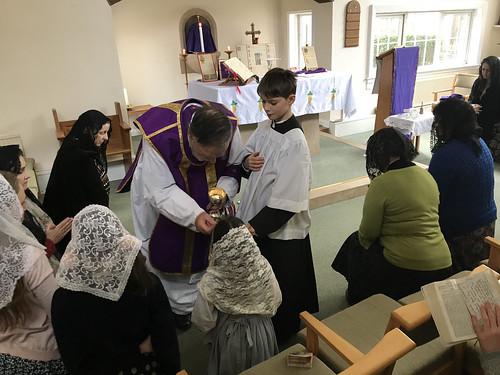
The retreatants worked unstintingly on the various vestment repairs, and achieved an astonishing amount, including replacing worn-out orphreys on a chasuble, reattaching fringe and clasps to a red and gold cope, re-making maniples and a burse, and repairing the nineteenth century handmade bobbin lace on an alb.
Mending these often very beautiful vestments, which will be used in celebrating the Holy Sacrifice of the Altar, is to assist at Mass in a tangible way; it is a reward in itself. It's no wonder that the retreatants form such a happy community while working together on them. Many thanks to everyone who braved the weather to take part. Next year's retreat will take place on the first weekend of February. Bookings will open shortly on the LMS website.
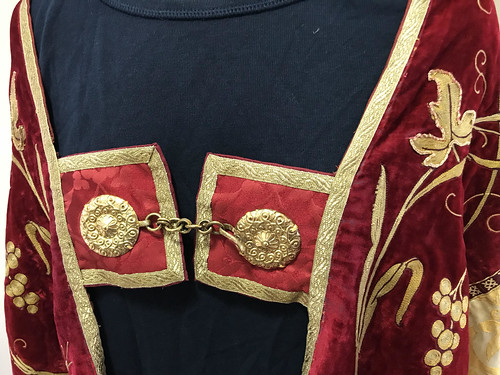 |
| New clasps on this cope: the tabs the clasps are one are also new. |
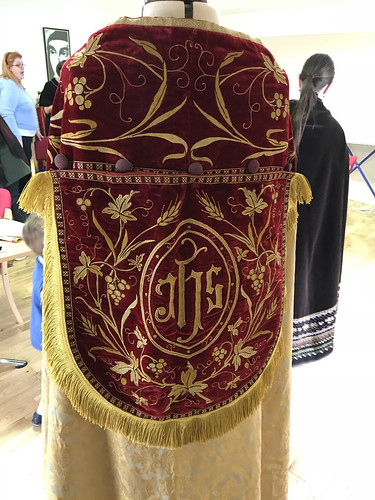 |
| The is the new fringe on the back of the same cope. |
Support the work of the LMS by becoming an 'Anniversary Supporter'.
FIUV Magazine relaunched
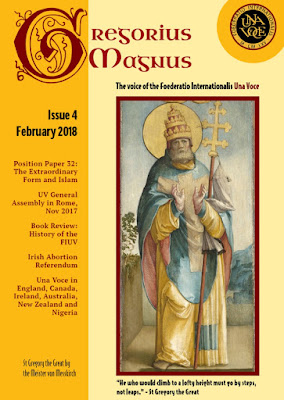
Cross-posted from Rorate Caeli.
I have pleasure in presenting the new edition of the quarterly magazine of the Foederatio Internationalis Una Voce (Una Voce International), Gregorius Magnus: the 4th edition.
It can be downloaded as a pdf here:
• Position Paper 32: The Extraordinary Form and Islam
• UV General Assembly in Rome, Nov 2017
• Book Review: History of the FIUV
• Irish Abortion Referendum
• Una Voce in England, Canada, Ireland, Australia, New Zealand and Nigeria
Support the work of the LMS by becoming an 'Anniversary Supporter'.
Book review: History of the FIUV by Leo Darroch

This review is in the current edition of the Latin Mass Society's magazine Mass of Ages. Cross posted from Rorate Caeli.
Una Voce: the History of the Foederatio Internationalis Una Voce 1964-2003, by Leo Darroch (Gracewing; 467pp)
Buy it from the LMS bookshop, Amazon.co.uk, or Gracewing
Support the work of the LMS by becoming an 'Anniversary Supporter'.
The Gospels of the first three Sundays of Lent
 |
| St Paul |
Peter Kwasniewski has an excellent discussion of the contrast between the Epistles (first readings) of the first three Sundays of Lent given us by the ancient Lectionary, and the Second Readings of Sunday Mass, usually Pauline Epistles, offered us by the 1969 Lectionary. Since there are three years of readings in the Ordinary Form there are nine passages to compare with the three of the EF. Not one of these nine passages so much as mentions the major theme of all three of the EF's selections: the importance of repentance from a sinful lifestyle, above all in relation to sexual sins.
So concerned were the compilers of the reformed Lectionary to avoid mentioning sin that they even cut out of the passages bits where the subject came up.
It is a nice illustration of a major strand of what happened in the Catholic Church when the reforms following Vatican II were implemented. Consider this, a passage commenting on yesterday's Epistle by Mgr Patrick Boylan (The Sunday Epistles and Gospels) which had its Imprimatur in 1941.
If there are among us Catholics, apparently convinced and genuine, who seek to minimise the sinfulness of unchastity, or the danger of its occasions, let us not be deceived by their words, nor follow their example. On all sides one hears voices raised against every attempt to check the growth of profligacy, every effort to restrict evil amusements and evil literature. We hear constantly of the 'sacred rights', of freedom--freedom, that is, to disregard the moral code, to follow the blind guidance of passion, to satisfy every form of curiosity, so see everything, to read everything. Popular literature is full of the 'empty words' [St Paul's phrase] with which all that is seductive to sense is represented as innocent because it is 'natural', or 'healthy', or because it 'develops the personality'!
Boylan, and no doubt the majority of his clerical and pious lay readers, was acutely aware of the ferocious assault which was being carried out against traditional sexual mores, a full twenty years before its hideous triumph in the sexual revolution of the 1960s. St Paul's exhortations were exactly what was needed at that time.
It was the moment when things were getting really, really bad--when a bad case of the common problem of all young people since time immemorial was turning into a social revolution which would permanently destroy the expectation of the permanency of marriage and of children being raised by their biological parents--that was the moment when the reformers chose to bury St Paul's message.
Everyone in the West in the middle decades of the 20th century was aware of the increasing gulf between the Catholic Church and the maxims of the world. Everyone was aware that Catholic communities, teachings, culture, and institutions were as a tightly-integrated group the last major refuge of a traditional Christian attitude.
It was for the Second Vatican Council to decide how to address this problem, and the path chosen, as far as anyone could tell through the confusion and chaos, was the path of appeasement. The consequences tell their own tale.
Support the work of the LMS by becoming an 'Anniversary Supporter'.

